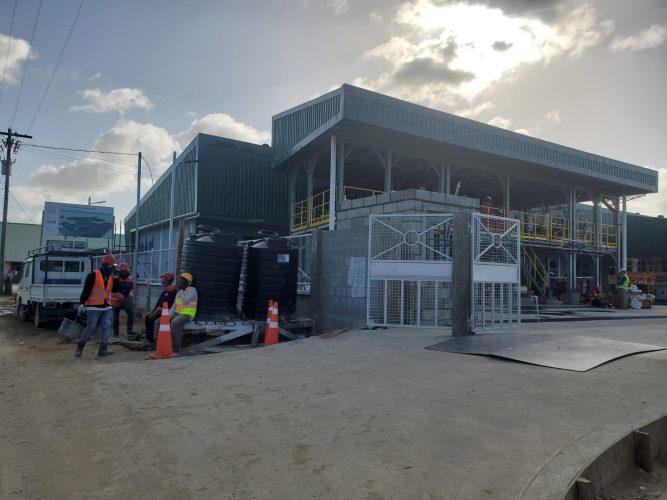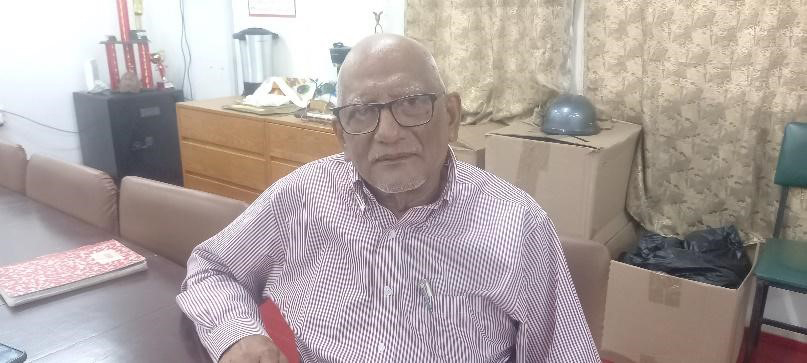With a total investment of over US$100 million, Guyana’s Technical Training College Inc, which is being built in the ancient county of Berbice, is likely to be envied in the Caribbean as its localised, hands-on technical training will also be needed in other countries.
To keep up with Guyana’s growing need for technical workers, the government has embark-ed on a forward vision project in collaboration with ExxonMobil, to construct and implement the Guyana Technical Training College Inc (GTTCI) in Port Mourant, Corentyne.
After fully being constructed the college will be designed to facilitate oil and gas training (Track 1) funded by ExxonMobil, Hospitality and Tourism Institute (Track 2) funded by the government with the Caribbean Development Bank and the Port Mourant Training College (Track 3) which falls under GuySuCo and the Ministry of Agriculture.

The first phase of the project to the tune of around US$14 million will soon be commissioned to start hands-on training for students to work directly on the floating production storage and offloading (FPSO) vessels.
Director of the Guyana Technical Training College Inc Professor Clement K Sankat, in an exclusive interview with the Sunday Stabroek, revealed that the first phase will allow for students to be trained directly by FPSO operators.
According to Sankat, since the announcement of the project some two years ago it has “progressed really far.
“Since I’ve been here, it’s going to be two years now, we’ve made a lot of progress. Let me put it this way, this is a partnership between the Government of Guyana and the Office of the President in particular and ExxonMobil… The Guyana Technical Training College will occupy 20 acres of land at the back there. This is the first phase.”
He said that there is a six-member committee including representatives from both sides that is managing the project.
“We had some initial challenges and then they decided to shift us a little further away… They’ve given us the land and so we had to design with what we had,” he added.
Narrowing down on Track 1 – oil and gas – Sankat said the main campus will offer diplomas in mechanical, electrical, process and operations, and instrumentation “all related to oil, very specialised.”
Additionally, he said that there will be a diploma in building construction on offer to support the countrywide boom in building and construction.
However, Sankat explained that what they are completing currently is a “facility stimulator”, which is part of the programme allowing “the ultimate part of the experiential training the students are going to have.”
He explained that the training programme was already active as ExxonMobil had taken several batches of workers to Canada for training. “The intent of the Government of Guyana with Exxon is to bring that programme home. So this thing is already happening but it cannot all happen until the facilities are in place,” he added.
According to Sankat, “We have one element of the facility in place now, this factor next door which is the facility stimulator. What this does, it will train the students hands-on, on equipment and the processes that they will face when they get out on the FPSOs.”
He stressed that the country could not have workers heading offshore without being properly trained. “There are issues of health and safety that are enormous and those are big issues that they have to be trained in so this facility here the students are going to spend six months literally working on equipment that they will be faced with on the ship, actually touch and feel,” he said
He further explained that the batch of about 25 students currently at the location, although they will be the first batch for the facility stimulator, have already received about one year of training in Canada. They have been trained “on the basics,” he said, however, they will now receive the “experiential training” in Guyana.
According to him, SBM, which operates the FPSO, will be conducting the training until Guyanese are trained to take it over, “training the trainers is so important. So the actual ship operators will train these students here in those four areas: mechanical, electrical, and all that.”
Touching on the employment aspect, Sankat said the present batch of students who geographically hail from around Guyana, will “get onto the ships” once they meet all the requirements in addition to the training they will be receiving.
The training will be about six months for every batch, as Sankat stressed, “we have to localise all the prior training and that could only happen when the campus is built and that is hopefully going to be finished by next year.”
The college is being constructed by Berbice company Rafeek and Sons Construction, which Sankat spoke highly of stating that they are carrying out timely and quality work; an overseas contractor from SBM will supply and commission the equipment.
Additionally, there are plans to also build a residence to house students at the location.
“Everything will become localised, we are planning for that, we are building for that and we are gearing up ourselves for that,” he stressed.
Meanwhile, Sankat stated that President Irfaan Ali has also signalled his intention to have the college internationally accredited, along with the possibility of a joint degree programme available from another globally accredited institution.
“What we are providing… is completely new to Guyana and even Trinidad that has produced oil for a hundred years, they don’t have anything like this. So we are providing cutting-edge, leading-edge training for technicians to work on the FPSO; few countries in the world have [done this],” he added.
Technical training
Sankat, a Berbician by birth and former pro-vice chancellor and Campus Principal of the University of the West Indies, encouraged parents and students to place much emphasis on the technical training which he said is an important need of the future world.
“I would tell them that this is a new Guyana being created here that is going to be driven by technology and they therefore need to equip their children, and your children need to seize the opportunities for technical education because that will ensure their success and they will go to heights that are yet unimaginable,” he said
Noting that previously technical training was placed somewhat on the back burner, Sankat stressed, “I am telling parents now that is what you should put as the priority for your children, technical education, and going to one of our technical institutes should be seen as something that you are taking along the right direction.”
He called on students from the various high schools to also place emphasis on technical training as part of their education adding, “This is the kind of education for today’s Guyana.”
He pointed out that one of the best ways to secure employment at the moment is to have a technician’s degree which can lead to an engineering degree. “Guyana is poised to go there. Guyana needs people, its own people trained to go there and here is an opportunity for young people, men and women,” he elaborated.
In terms of the Port Mourant Training College, which is a part of the project, Sankat said, “My vision is to build upon this and build a new institution that has more modern equipment… They do a tremendous job here but I just would like to see the students be exposed to more cutting-edge technology.”
Sankat also called on young women to take part in the programmes available and the opportunities to become engineers and technically trained.
“This is a real exciting time for Guyana and especially Port Mourant and Berbice that we are building something here that has not been seen yet in Guyana… It creates a real growth that in fact I would not be surprised that when this thing is up and running students from our surrounding countries would have to come here,” he said.
“We are going to build something that’s going to be the envy of our neighbouring countries and one that I hope can only grow in leaps and bounds as our industries develop here. And we are the ones, our people will be the ones to develop these industries down the road.”
Congratulating the government of Guyana, Sankat said the vision to have a technical training college built to support the new economy, which is one inclusive of oil and gas, is forward-thinking.






